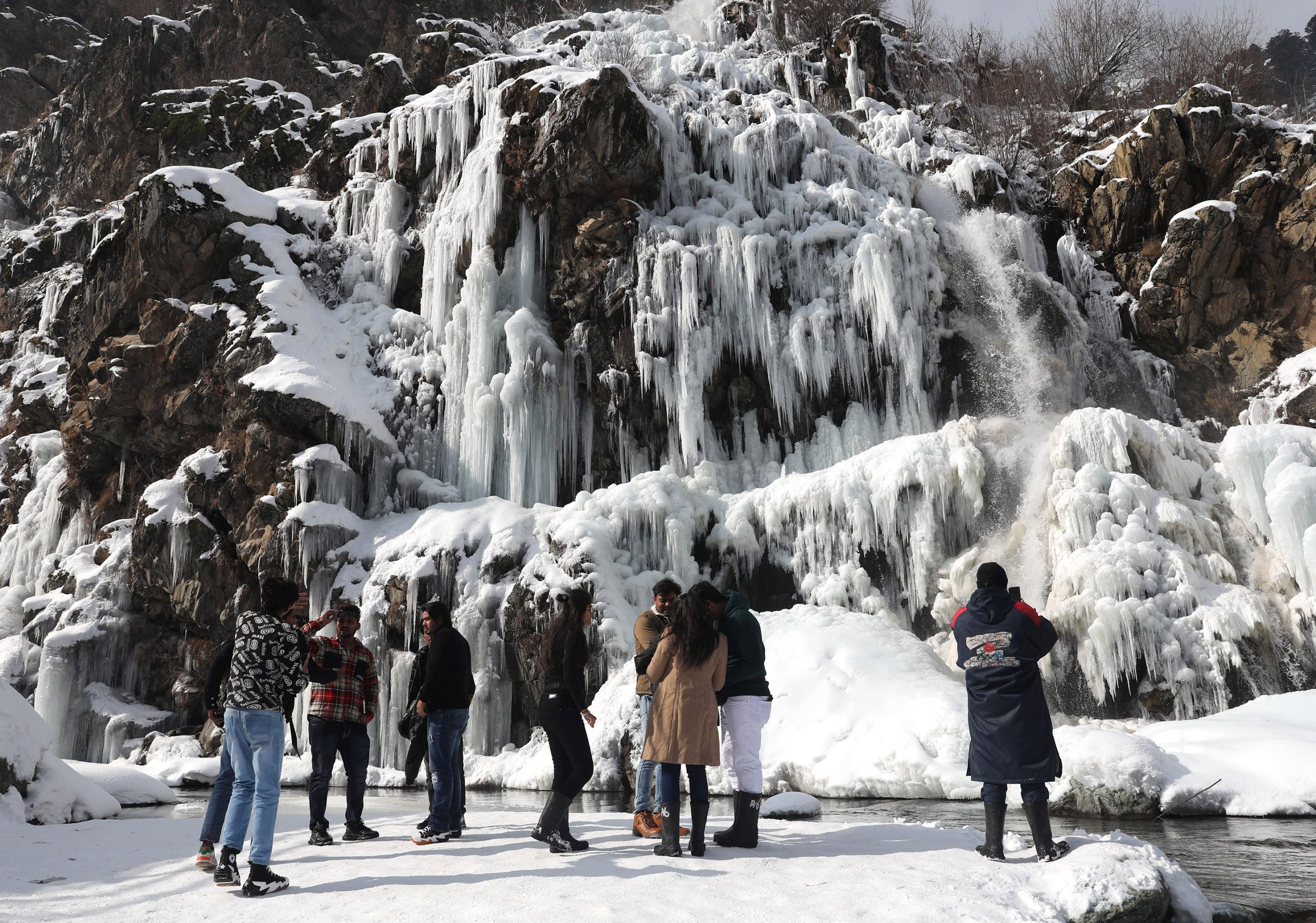By: Dr Rizwan Yousuf
ChillaKalan, the 40-day period of intense winter, is a defining feature of Jammu and Kashmir, bringing freezing temperatures, heavy snowfall, and a range of challenges for both residents and visitors. This harsh phase, which usually starts 21 December, is marked by bitter cold and poses serious risks to health and infrastructure.
The extreme cold during ChillaKalan poses a significant risk to health, particularly for vulnerable groups such as the elderly, children, and those with pre-existing medical conditions. The harsh winter conditions, with temperatures dropping to sub-zero levels, can lead to serious health problems, ranging from frostbite and hypothermia to aggravated respiratory conditions like asthma and bronchitis.
Hypothermia and Frostbite: Hypothermia occurs when the body’s core temperature drops below 35°C, causing the body to lose heat faster than it can produce it. This condition is especially dangerous for the elderly and young children, who may not have the physical resilience to withstand prolonged exposure to cold. Frostbite, another serious risk, occurs when body tissues freeze due to extreme cold, often affecting fingers, toes, ears, and the nose. This can lead to permanent damage or loss of these body parts if not treated immediately.
Respiratory Problems: The cold air in Jammu and Kashmir exacerbates pre-existing respiratory conditions such as asthma, bronchitis, and chronic obstructive pulmonary disease (COPD). During ChillaKalan, local hospitals report a surge in cases of respiratory distress. For individuals who suffer from asthma or similar conditions, the cold can trigger severe attacks, making it harder to breathe and causing discomfort. People with weakened immune systems or pre-existing lung conditions are especially vulnerable to these cold-induced complications.
Prevention and Safety Tips: Health experts emphasize the importance of staying indoors during the coldest hours of the day, particularly in the evening and early morning when temperatures reach their lowest. For those who must go outside, it is essential to dress in layers, including thermal undergarments, woolen sweaters, and insulated jackets. Hats, scarves, gloves, and thick socks are also vital to protect extremities. In addition, individuals with respiratory conditions should be extra cautious, avoiding exposure to cold air as much as possible and following their doctor’s advice for medication and management.
ChillaKalan doesn’t just bring physical health risks; it also challenges the infrastructure of Jammu and Kashmir. The region’s power supply, transportation, and other essential services are put under severe strain during this time.
Transportation Disruptions:Snow accumulation on roads and highways can cause major disruptions in transportation, making travel hazardous and often impossible. Vehicles become stuck, and roads may be completely blocked in areas affected by heavy snowfall. This has a direct impact on daily life, as locals find it difficult to get to work, attend school, or access vital services. For tourists, navigating these treacherous roads can be a challenge, as snow chains and other precautions are often needed for safe driving.
Power Outages:Another major issue during ChillaKalan is power outages. The snow and ice accumulation on power lines and trees can cause them to snap, leading to disruptions in electricity supply. This is particularly problematic in remote areas where restoring power takes longer. Residents are advised to prepare for power outages by stocking up on essentials like blankets, candles, and non-perishable foods. Authorities are always on the lookout for power disruptions and work to restore services as quickly as possible, but it is crucial to be prepared for the worst.
ChillaKalan’s beauty, with snow-covered landscapes and opportunities for winter sports, draws a significant number of tourists to Jammu and Kashmir. Ski resorts like Gulmarg, Sonamarg, and Pahalgam become bustling centers of winter tourism, attracting both national and international visitors. The picturesque beauty of snow-capped mountains, frozen lakes, and scenic valleys makes it a winter wonderland. However, despite the attraction, tourists must be aware of the potential dangers that come with the region’s severe weather conditions.
Safety Concerns: One of the most significant safety concerns during ChillaKalan is the risk posed by slippery paths, ice patches, and deep snow. Hiking trails, skiing slopes, and other outdoor recreational activities become hazardous without proper precautions. Accidents, such as falls and injuries, are common during this period, particularly when tourists venture off-marked trails or do not heed local safety advice. Additionally, access to some of the more remote tourist destinations becomes limited or entirely blocked due to heavy snowfall, making travel more difficult and less safe.
Travel Tips for Tourists:Tourists are urged to regularly check weather forecasts and stay informed about road conditions and potential travel restrictions. It is advisable to book accommodations and excursions through reputable agencies that are familiar with the weather patterns and safety requirements. Furthermore, visitors should always carry essential items such as warm clothing, waterproof gear, first aid kits, and flashlights when exploring outdoor areas. Being cautious and following local advice will go a long way in ensuring a safe and enjoyable trip.
ChillaKalan also takes a toll on the region’s agriculture. Jammu and Kashmir is famous for its apple orchards, walnut plantations, and other fruit crops. However, the extreme cold during ChillaKalan can lead to significant losses for farmers, particularly if there is a heavy frost.
Frost Damage Frost can damage the delicate buds of fruit trees, especially apples, walnuts, and almonds, leading to a loss of crops for the season. Similarly, vegetable cultivation may be affected as frost can kill young plants or delay growth, leading to a reduced harvest. Farmers are advised to take preventive measures to safeguard their crops, such as using protective covers for vulnerable plants and ensuring that their fields are well-irrigated to reduce the risk of frost damage.
Economic Consequences: The economic impact of frost damage can be severe, especially in a region where agriculture is a major source of income for many families. Reduced yields lead to higher prices for agricultural products and may cause supply shortages in local markets. Additionally, the time and financial resources required to recover from crop damage can be devastating for farmers already struggling with the challenges of winter.
What You Can Do to Stay Safe
With the many challenges posed by ChillaKalan, it is crucial for residents and visitors alike to take necessary precautions to stay safe and minimize risks. Here are some key safety tips:
- Dress in Layers:Layering is the most effective way to keep your body warm. Insulated clothing, woolen hats, scarves, gloves, and thick socks are essential. Avoid tight clothing that can restrict circulation.
- Stay Indoors During the Coldest Hours: If possible, stay indoors, especially during the evening and early morning when temperatures are at their lowest.
- Prepare Your Home for Winter: Ensure that your home is well-insulated and heated safely. Stock up on essential supplies like water, blankets, and non-perishable foods in case of power outages.
- Travel with Caution:Avoid unnecessary travel during heavy snowfall. If you must travel, ensure that your vehicle is equipped with snow chains, blankets, and other winter gear.
- Protect Livestock:Farmers should ensure that livestock are kept warm in well-insulated barns or sheds to protect them from the extreme cold.
“Together, we can endure and overcome the harsh winter.”
The writer is currently working as an Assistant Professor at the University Institute of Science, Chandigarh University. rizwanwar50@gmail.com





